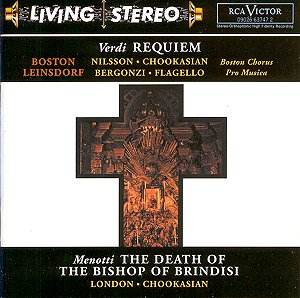Leinsdorf’s reading of Verdi’s mighty Requiem is a
fascinating but ultimately flawed document. Recorded in 1964/5 and issued
on RCA SER5537/8, it had to shape up against the impressive credentials
of Giulini’s famous and visionary reading with the Philharmonia Orchestra.
RCA’s ‘Living Stereo’ recording sounds dated now, to be sure, but there
is no doubting the fact that its immediacy adds to the impressive effect,
even if the stereo separation is generally too pronounced.
One of the first things which surprises about this
performance is that the soloists sound so well matched (try the ‘Quid
sum miser’ section of the ‘Dies Irae’, or the exposed octaves in the
‘Agnus Dei’), something one would not immediately expect given such
a conglomeration of large vocal personalities. This means that whilst
each of them is more than capable of announcing their presence, they
work well together for the greater good. Bergonzi’s entrance five minutes
in to the first section (‘Reqiuem and Kyrie’) is neither reverential
nor religiously fervent. Rather, it is a statement of quasi-operatic
intent. Nilsson, entering a little later, is more than happy to match
him. Later, she positively relishes the opportunities to float up to
the higher registers. Lili Chookasian possesses a creamy mezzo, heard
to excellent effect in the ‘Recordare’, where she is truly tender in
Verdi’s best fashion.
The Boston Pro Musica Chorus has its work cut out in
this piece, and the Boston Symphony Orchestra does not seem in the mood
to make any concessions to volume. As a result, there is a hint of strain
from the choir in the almighty ‘Dies irae’ as they struggle to rise
above the wave of brass (and again in the ‘Tuba mirum’). Overall, there
is little serious fault from either soloists or choir. Perhaps where
this account falls short is the conductor’s vision. It is like listening
to an admittedly very well evoked series of well-paced and always graphically
painted dramatic excerpts, rather than a cogent whole that can in the
right hands be overwhelming in effect.
The two fillers for the second disc originally made
up one LP (RCA SB6609). Indeed, the Menotti may well provide the impetus
for the curious at heart to purchase this set. Universally known for
Amahl and the Night Visitors, The Death of the Bishop of Brindisi
(premiered in 1963) is another piece that centres on the innocence of
youth. This time, the Bishop of Brindisi relives the departure of a
crusade of children who were intent on reaching the Holy Land to free
the Holy City, and their cruel fate. Menotti’s style is effective because
of its very simplicity, his harmonies at once appealing and poignant.
George London makes an appropriately anguished priest, and the children’s
chorus is exceptional.
The rich, lush outpourings of the two excerpts from
Schoenberg’s Gurrelieder act as the ideal foil to Menotti’s world.
In some ways the Schoenberg is the highlight of the set. Leinsdorf elicits
crystal clarity from his forces (no mean feat in this work) and Chookasian
reinforces the positive impressions she made in the Requiem. She places
her high notes quite beautifully and, impressively, avoids excessive
vibrato.
Certainly, despite impressive moments, Leinsdorf’s
Verdi Requiem could in no circumstances be a top recommendation. Although
it contains much of interest, the Menotti is a fascinating and unusual
bonus, and full text is included.
Colin Clarke

![]() aBirgit Nilsson
(soprano); Lili Chookasian (mezzo); aCarlo Bergonzi (tenor);
aEzio Flagello, bGeorge London (basses); aBoston
Pro Musica; bNew England Conservatory Chorus; bMembers
of the Catholic Memorial and St. Joseph’s High School Glee Clubs; Boston
Symphony Orchestra/Erich Leinsdorf.
aBirgit Nilsson
(soprano); Lili Chookasian (mezzo); aCarlo Bergonzi (tenor);
aEzio Flagello, bGeorge London (basses); aBoston
Pro Musica; bNew England Conservatory Chorus; bMembers
of the Catholic Memorial and St. Joseph’s High School Glee Clubs; Boston
Symphony Orchestra/Erich Leinsdorf. ![]() RCA VICTOR
LIVING STEREO 09026 63747-2 [two discs] [130.35]
RCA VICTOR
LIVING STEREO 09026 63747-2 [two discs] [130.35]